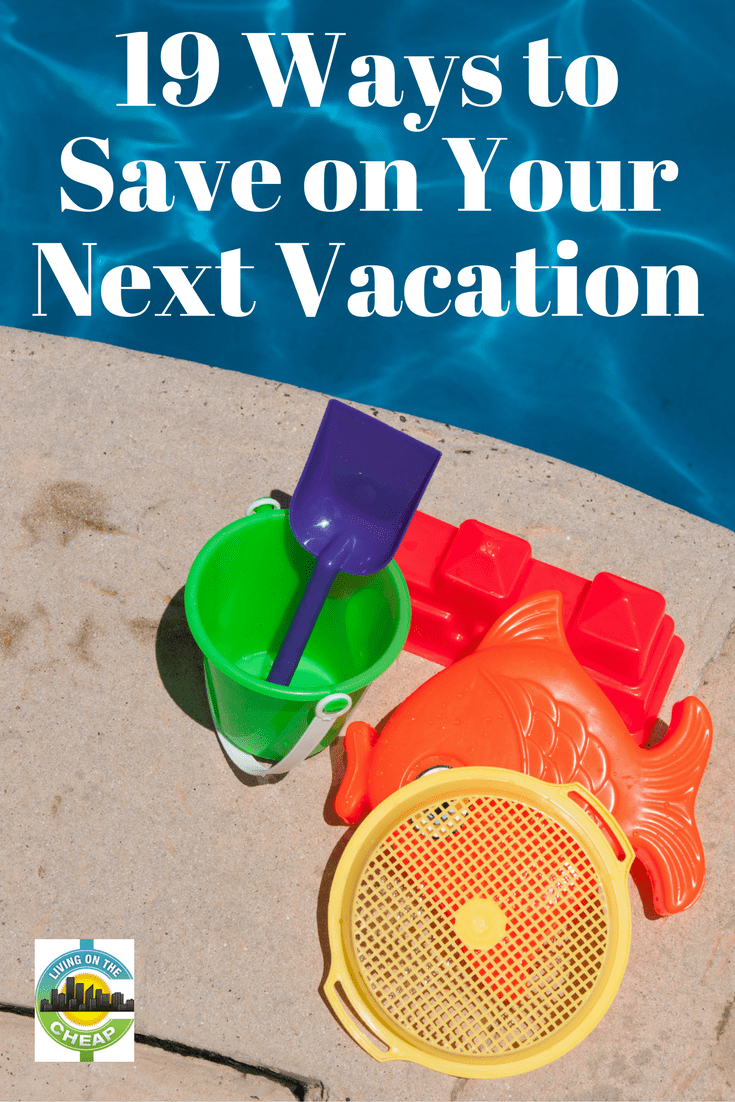You’ve booked an affordable vacation, but what happens when you arrive at your destination and your brain enters vacation mode? Suddenly, you’ve forgotten your budget, and are jumping at all the you-only-live-once vacation purchases: restaurants, excursions, souvenirs and the like.
You can still have a great time without spending a fortune on your vacation. The key is looking for ways to save during your trip. Make smart decisions about where you should splurge and where you can cut corners without cutting down on your fun.

Photo: Deposit Photos
If you’re wondering how to save money on vacation, follow these 15 tips to keep your vacation spending in check. It’s a little extra effort, but you’ll be able to enjoy yourself on your travels without paying for it (with interest!) in the months that follow.
Ignore the upsell
The rental car company in Hawaii will try to convince you that you need the premium SUV when you ordered a compact car. The airline might ask you if you want to upgrade to premium economy for just $100 more. If you want to save money on vacation, save no to the VIP package, the upgrade or any other upsells on vacation purchases you already budgeted for.
Avoid touristy restaurants
Ask your hotel staff or a local where to find great food in the area. Meals at local haunts are usually a less expensive than tourist-focused eateries. An added bonus? You’ll meet some of the locals.
Speaking of eating, avoid eating at the hotel restaurant if possible. Hotels typically have higher-priced meals, and the quality is not nearly as good as other places you’ll find around town.
Order groceries or hit the supermarket
On a Disney trip one year, we used an online grocery delivery service to ship items on the day we arrived. While we paid more than for a normal grocery trip, it was still cheaper to prep some breakfasts in the morning and snacks for the day than it would have been to eat out every day.
We also ordered a couple of cases of water, and threw bottles in the freezer to carry along each day. (They also served as an ice pack for our fresh fruit, yogurt and other portable snacks.) That meant we didn’t have to shell out for $5 bottles of water once the hot Florida sun beat down on us.
If you’re staying at a hotel, eat breakfast in your hotel room and pack a to-go lunch, then save the dining-out dollars for dinner. If you’re in a rental house with a full kitchen, consider eating lunch out wherever you’re exploring and cook a cheap dinner when you get back to the house at night. Preparing some of your own meals saves you money, plus you can better manage the calories you consume each day.
Pack a snack stash
There’s nothing that irks me more than paying quadruple for a bag of pretzels at the airport or while waiting in line for an attraction. You save money on your trip by packing snacks, like granola and protein bars, so that you don’t cave to convenience costs when hunger strikes.
Don’t think that only kids need snacks, either. Make sure you have enough food for yourself. Toss kid-favorite comfort foods, like peanut butter and jelly sandwiches or packs of goldfish crackers, into your day pack, so you’re always prepared.

BYOB at the hotel
Have a beer or glass of wine before heading out to dinner. Restaurants charge a premium for a glass of alcohol, so if you have cocktails in your room before or after you go to the restaurant, you can save a lot of cash.
Get the rewards
Sign up for FREE reward/loyalty programs and get points for future travel. You might also get something free for this trip. Hotels, restaurants and lots of places offer free rewards programs.
Have a phone call plan
If you’re going on a cruise or leaving the country and you want to call home, you can get hit with horrifying fees. Call your provider before you go to see if you can pay for extended coverage up front, or if there’s a daily-rate international plan. It might be economical to switch to a plan that offers free or lower-cost texting and data use overseas.
The cheapest options for international calling if you have wifi available are Internet-based calling apps like Whatsapp or similar services. All of them have pros and cons, depending on whom you’re calling, where you’re calling from and where you’re calling to.
Purchase online deals
Groupon and sites like it offer discounts and deals on restaurants, entertainment and attractions. Look for deals in your travel destination so you’re not paying full price for admission everywhere you go. Read the fine print on deals to make sure there are no exclusions to consider.

Photo: Deposit Photos
Go halfsies
Purchase half-price tickets to shows and other events online. Sign up as a GoldStar member and save on concerts and other events.
Bundle the museums and theme parks
Save up to 50% or more on the cost of admission to multiple attractions such as museums, amusement parks, theme parks including Disney World and other attractions in select cities. Use CityPass, Go City Card, or other online sites to find these deals.
Get cash in advance
Avoid using ATMs that charge fees for using them. Plan ahead with enough cash to be safe, and use debit cards or credit cards when possible to earn points. Use your banking app to locate no-fee ATMs in our vacation destination.
Skip the souvenirs
Sure, souvenirs are fun, but you can spend a lot of unnecessary money on them. The allure almost always disappears when you get home, and they end up in the trash. Take pictures with your phone or camera to capture memories, instead.
Or, if you like to take something home, plan ahead for it. Add a certain amount to your budget, and look for things that can be used in your daily routine at home, like a colorful bowl or a scarf.

Ask for discounts
If you or someone traveling with you is a veteran or active military, you may automatically be eligible for discounts. And if you are 50 years of age or older, always ask about a senior discount. Traveling with kids? Ask if attractions have child or student rates, and look for restaurants that offer free kids’ meals on certain weeknights.
Take advantage of AARP, AAA and other organizations to snag discounts. Some hotels will also offer deals for seniors or disabled travelers, so if a member of your party fits the bill, be sure to ask.
Another tip: Some museums have reciprocity agreements, so if you’re a member of the science museum in your home city, you might be eligible for discounted admission at a science museum in another city. Check with your local attraction before you go to find out what museum associations it belongs to.
Seek out free Wi-Fi
Internet rates at your hotel or on your cruise ship can be expensive. But there’s plenty of free Wi-Fi to be had if you look. Sign up for your hotel’s loyalty program; many of the big chains offer free internet access to members. Grab a coffee at a cafe that offers free Wi-Fi to customers.
Ask at the tourist information office, your hotel or even at a museum or other attraction about where to find free Wi-Fi. They likely get that question a lot and can steer you in the right direction.
Shop around or haggle
Americans are accustomed to the listed price being set in stone; people from other countries are more used to bargaining over goods and services. Before you agree to buy that souvenir or book a tour, make a counter-offer. You might be able to get a vendor to lower the price.
Similarly, don’t go with the first restaurant, shop or tour company you encounter. Shop around. The T-shirt that’s $10 at the first store might be $7 at the second. The burrito lunch might cost a dollar or two less the farther you get from the central tourist area. Get quotes from several tour operators before you sign up for that snorkel trip or city tour. It might not always work, but your comparison shopping will eventually pay off when you find the best-priced offer.


Great advice!